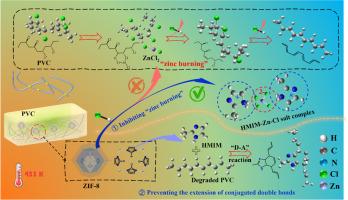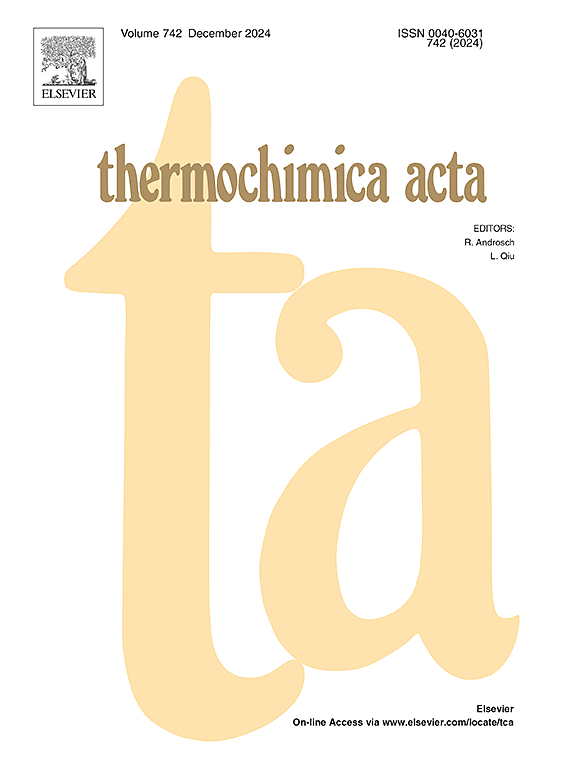沸石咪唑酸盐框架-8 对聚氯乙烯热稳定机制的启示
IF 3.1
2区 化学
Q2 CHEMISTRY, ANALYTICAL
引用次数: 0
摘要
用于聚氯乙烯(PVC)的沸石咪唑酸框架-8(ZIF-8)的热稳定性已受到关注,但其热稳定性机理有待进一步阐明。本文首次以硬脂酸锌为锌源,有效合成了具有高比表面积和大孔隙率的硬脂酸改性 ZIF-8。硬脂酸的改性使 ZIF-8 对盐酸的吸附容量更大,对 PVC 的热稳定性效果更好,尤其是长期热稳定性。此外,实验和理论计算还证明了 ZIF-8 对 PVC 的热稳定性机理。除了吸收 HCl 以消除 PVC 的自催化降解外,ZIF-8 还会分解并形成 2-甲基咪唑-锌-氯盐络合物,而不是游离的 ZnCl2,从而避免了锌的负燃烧效应。此外,咪唑环与降解聚氯乙烯之间的 Diels-Alder 反应可防止聚氯乙烯共轭双键的延伸,延缓聚氯乙烯颜色的加深。本文章由计算机程序翻译,如有差异,请以英文原文为准。

Insights into the thermal stabilization mechanism of zeolitic imidazolate framework-8 for poly(vinyl chloride)
The thermal stability of zeolitic imidazolate framework-8 (ZIF-8) for poly(vinyl chloride) (PVC) has received attention, but its thermal stabilization mechanism needs further clarification. Herein, the stearic acid-modified ZIF-8 with high specific surface area and large pore volume was effectively synthesized by using zinc stearate as the zinc source for the first time. Modification of stearic acid results in larger adsorption capacity of ZIF-8 for HCl and better thermal stability effect for PVC, especially long-term thermal stability. Moreover, the thermal stability mechanism of ZIF-8 for PVC was demonstrated by experiments and theoretical calculations. In addition to absorbing HCl to eliminate autocatalytic degradation of PVC, ZIF-8 disintegrates and may form 2-methylimidazole-Zn-Cl salt complex instead of free ZnCl2, avoiding the negative zinc burning effect. Furthermore, the Diels-Alder reaction between imidazole ring and degraded PVC prevents the extension of the conjugated double bonds of PVC and delays the deepening of the color of PVC.
求助全文
通过发布文献求助,成功后即可免费获取论文全文。
去求助
来源期刊

Thermochimica Acta
化学-分析化学
CiteScore
6.50
自引率
8.60%
发文量
210
审稿时长
40 days
期刊介绍:
Thermochimica Acta publishes original research contributions covering all aspects of thermoanalytical and calorimetric methods and their application to experimental chemistry, physics, biology and engineering. The journal aims to span the whole range from fundamental research to practical application.
The journal focuses on the research that advances physical and analytical science of thermal phenomena. Therefore, the manuscripts are expected to provide important insights into the thermal phenomena studied or to propose significant improvements of analytical or computational techniques employed in thermal studies. Manuscripts that report the results of routine thermal measurements are not suitable for publication in Thermochimica Acta.
The journal particularly welcomes papers from newly emerging areas as well as from the traditional strength areas:
- New and improved instrumentation and methods
- Thermal properties and behavior of materials
- Kinetics of thermally stimulated processes
 求助内容:
求助内容: 应助结果提醒方式:
应助结果提醒方式:


